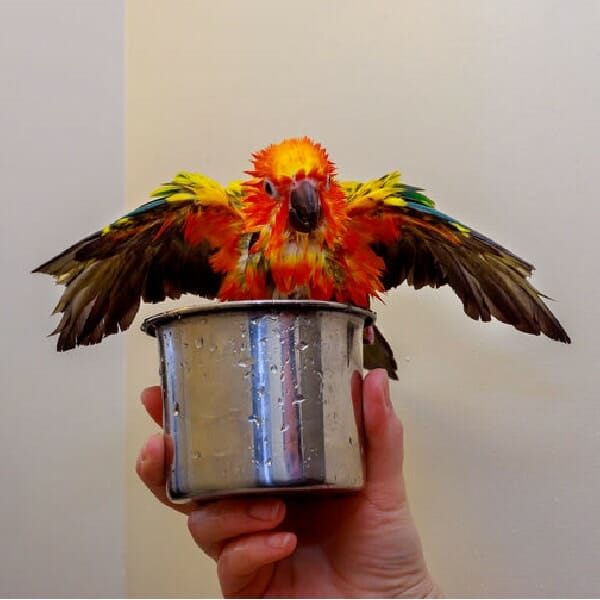Is My Blue and Gold Macaw Going Thru the Terrible Twos?
Michelle H. wants to know,
Does my Blue and Gold Macaw go thru the terrible twos?
She picks at my clothes, my blankets, and when I put her up at night she dumps her food on the floor.
Michelle H. wants to know,
Does my Blue and Gold Macaw go thru the terrible twos?
She picks at my clothes, my blankets, and when I put her up at night she dumps her food on the floor.
Nauman asks
I am messaging about a Green (African) ringneck male I recently bought from a pet shop (who said he is 6 months old ) however he has a clear ring not on the full neck but it’s there.
Anyways the first day he didn’t eat anything, the second day he’s started to eat the mix of seeds.
He’s not hand tamed and not aggressive unless you try to grab him (which is not what I’m am trying to do)
Charles S. relates
My bird is 14 years old. I have had him/her since being a baby!
Every day she regurgitates about a cup full in her cage!
When I leave her with an experienced bird keeper she does not do this!
They indicated that I may be petting her in a way that arouses her and that may be the problem.
She has been doing this for years.
Could it be how I’m feeding her? Usually, I feed her orange slices, 1 cracker, 2 peanuts, and a scoop of Zupreem twice a day.
Plus I give her another couple of peanuts as a treat during the day?
Rachel C. is concerned,
My African grey picks his feathers.
He has free roam of the house with a large perch in the living room.
He doesn’t like water and doesn’t like any toy I get him.
He does like the challenge of taking the lids off old pill bottles to find a treat.
He likes very few people.He definitely does not like little people. He goes outside with me and enjoys climbing around. I put him in the cage
Sarah F. inquires
We like to take our parrots camping with us (and our dogs and horses).
We’re thinking of going earlier, hence colder this year.
How much cold can they take?
It’ll probably get in the high 30’s in the AM (inside the camper).
Thank you

Chris T. is concerned about:
My 2 birds are not repelling some of the water.
I’m not sure how to state this but the water would bead up and not get completely wet.
After bathing could fly. Now they are completely wet and cannot fly.
I am wondering if they have a vitamin deficiency, or it can just be age?
Kirstin B. relates
Hi,
I have a blue and gold macaw parrot. He has been in the family since he was a baby. Sadly my great uncle was the one who got him and died shortly thereafter.
He has gone through 2 other family members until sitting with me and my dad.

Joanne C. Inquires
Dear Mitch and Catherine.
Our 22-year-old sun conure recently passed.
She was a family member her entire life.
We occasionally look at bird rescue sites.
My hesitation is we have 2 dogs that limit just how much a bird can be out of the cage.
To answer “If I get a bigger parrot like a cockatoo” is a fool’s errand.
An Umbrella cockatoo is roughly 18 inches long and weighs 1.4 lbs.
Thank you for acknowledging a category for “large macaws,” you’ve been paying your due diligence.
My knowledge base comes from operating a website that sells exclusively to pet bird keepers.
You can read about 1400 posts I’ve written on pet bird care.
Re: “Please don’t kid yourself there are no large parrot species that is any less difficult than the other to take care of” (below).
First, off one person’s, anecdotes should not be a driver on how to create a single bird or a flock’s environment.
Re: “ I recently bought a brand new TV and thanks to my parrot it has a crack in the screen”